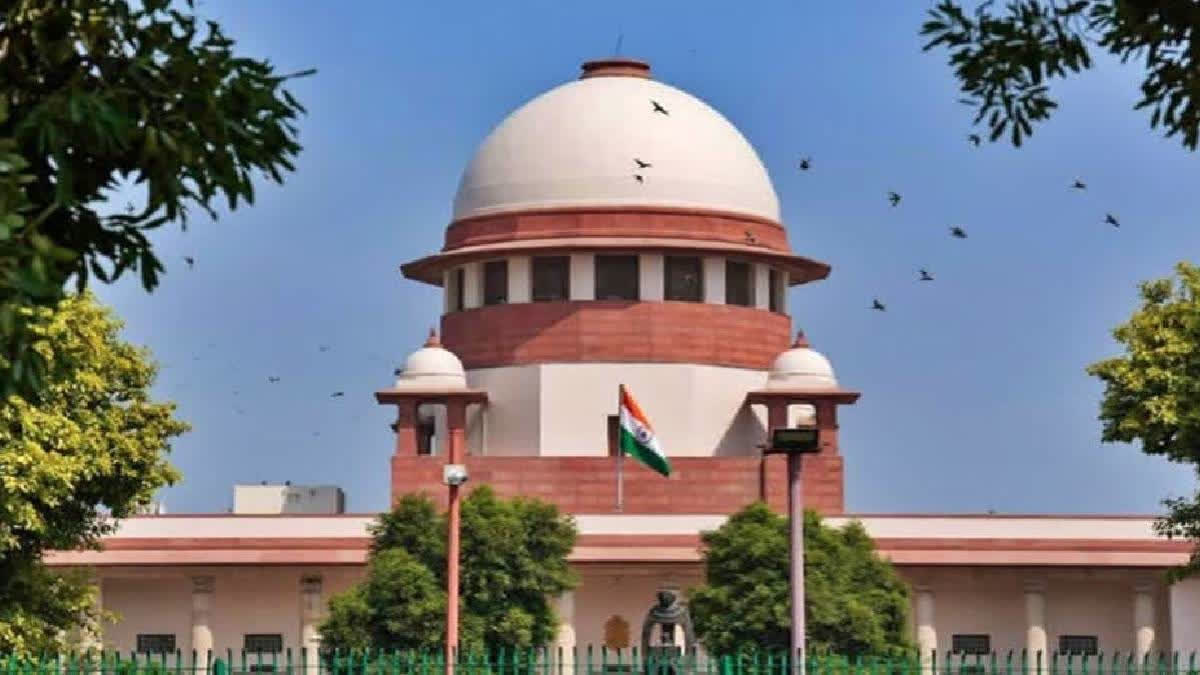New Delhi: "Law is supposed to be a noble profession," the Supreme Court observed on Thursday, and voiced surprise over how can one of the convicts in the Bilkis Bano gang-rape case and murder of her family members during the 2002 Gujarat riots practise law after his conviction, the remission of his sentence notwithstanding.
The matter came to court's notice when advocate Rishi Malhotra, defending the remission granted to Radheshyam Shah, one of the 11 convicts who were released prematurely, told a bench of Justices BV Nagarathna and Ujjal Bhuyan that his client has served over 15 years of actual sentence and that the state government gave him the relief after taking note of his conduct.
"Today, almost a year has lapsed and there has not been a single case against me. I happen to be lawyer at a motor accident claims tribunal. I was a lawyer and I have again started practising," Malhotra submitted. "Post-conviction, whether licence to practise can be given? Law is supposed to be a noble profession. Bar Council (of India) has to say whether a convict can practise law. You are a convict, there is no doubt about that. You are out of jail due to the remission granted to you. Conviction remains only the sentence is cut short," the court said. "I am not sure about that," Shah's lawyer responded.
Section 24A of the Advocates Act states that a person convicted of an offence involving moral turpitude cannot be enrolled as an advocate. It also states that disqualification for enrolment shall cease to have effect after a period of two years has elapsed since his release or dismissal or removal.
Malhotra submitted the Gujarat government had released Shah, after taking note of the no-objection from the Jail Superintendent, Godhra as well as the committee on remission, coupled with the fact that the Home Department as well as the Union government had all recommended and approved his premature release. "It is nowhere mentioned in either of the remission policies that all the stakeholders have to give unanimous opinion for release of a convict nor does it specify that it should be majority decision which should prevail on the decision making process. All that it says is that the State Government should collate various opinions from different quarters in order to arrive at premature policy decision," Malhotra told the bench.
The Gujarat government had released the 11 convicts on the basis of the 1992 remission policy and not the policy adopted in 2014 which is effective today. Under the 2014 policy, state cannot grant remission for a crime investigated by the CBI or where people have been convicted of murder with rape or gang-rape. Contending that the rights of victim are restricted under the Code of Criminal Procedure (CrPC), senior advocate Sonia Mathur, appearing for another convict Bipin Chandra Joshi, submitted the victim cannot challenge judicial order on sentence pursuant to the trial as the right is confined to only to the State.
Maintaining that the compensation awarded in Bilkis Bano's case is highest ever in a gang-rape case, Mathur said if there is a flaw in a process, that's for the State to answer. "I am not at all being insensitive to what has happened. No one deserves that. I am not submitting what has happened can be brought back by paying compensation... "Insofar as her rights are concerned, she has been awarded compensation, she has been given a job, accommodation. This is what was given to her, as opposed to (convict's) rights," she said.
Opposing the locus standi of the PIL petitioners in the case, Mathur said none of the parties here are allowed to interfere at stage of remission. She said the convicts are entitled to be prematurely released subject to the condition being fulfilled. Mathur said even the top court has been ruling in favour of premature release of convicts. "We wish you would canvass reformative theory for all the prisoners who have completed 14 years in India. How many remissions have taken place? Why are our jails overcrowded," the bench remarked.
Mathur told the court that Joshi's wife is suffering from cancer. "In my case, fine of Rs 6,000 has been paid in 2019 and trial court has accepted it without objection," she said. The hearing in the case will resume on August 31. The top court had on August 17 said state governments should not be selective in granting remission to convicts and the opportunity to reform and reintegrate with society should be given to every prisoner, as it told the Gujarat government which defended its decision of premature release of all 11 convicts.
At an earlier hearing, TMC MP Mahua Moitra had told the apex court that the gang-rape of Bilkis Bano and murder of seven of her family members were a "crime against humanity", and accused the Gujarat government of having failed to exercise its constitutional mandate of protecting the rights of women and children by granting remission to the 11 convicts in the "horrendous" case.
Besides the petition filed by Bilkis Bano contesting the remission granted to them, several other PILs including one by CPI(M) leader Subhashini Ali, independent journalist Revati Laul and former vice-chancellor of Lucknow University Roop Rekha Verma have challenged the remission. Moitra has also filed a PIL against the remission. Bilkis Bano was 21 years old and five months pregnant when she was gang-raped while fleeing the horror of the communal riots that broke out after the Godhra train-burning incident. Her three-year-old daughter was among the seven family members killed in the riots. (PTI)



